AI Didn't Kill Quality Content—It Made It Non-Negotiable
There's a misconception that AI makes it easier to create content, so quality standards will drop. The reality? They're rising.
-1.png)
In digital marketing and content creation, a new player has emerged: the AI copywriter. But what exactly is an AI copywriter, and how does it fit into the broader ecosystem of content creation? This article covers the world of AI-assisted copywriting, exploring the roles of prompt engineers, AI content editors, AI content generators, and AI content managers, and their place within the marketing function.
An AI copywriter is not a sentient machine churning out perfect prose, but rather a sophisticated tool that assists human writers and marketers in creating content. AI systems, powered by advanced language models like GPT (Generative Pre-trained Transformer), can generate human-like text based on given prompts or parameters.
AI copywriting tools can help create various types of content, including:
While these tools are powerful, they require human guidance and oversight to produce truly effective content. This is where specialized roles come into play.
Prompt engineering is a crucial skill in the world of AI copywriting. A prompt engineer is responsible for crafting the initial instructions or 'prompts' given to the AI system. This role requires a deep understanding of both the AI's capabilities and limitations, as well as the specific content needs of the organization.
Key responsibilities of a prompt engineer include:
In the marketing function, prompt engineers work closely with content creators and strategists to ensure that AI-generated content aligns with brand voice, target audience preferences, and overall marketing objectives.
While AI can generate content quickly, it often requires human refinement. This is where AI content editors come in. These professionals are responsible for reviewing, editing, and enhancing AI-generated content to ensure it meets quality standards and effectively serves its intended purpose.
Key responsibilities of an AI content editor include:
In the marketing hierarchy, AI content editors often work under the supervision of content managers or marketing directors, serving as a bridge between raw AI outputs and polished, publication-ready content.
AI content generators are professionals who specialize in using AI tools to produce large volumes of content efficiently. Unlike prompt engineers who focus on crafting inputs, content generators are experts in using AI systems to their full potential, often working with multiple tools and platforms.
Key responsibilities of an AI content generator include:
In marketing departments, AI content generators often work alongside traditional copywriters and content creators, focusing on high-volume content needs or initial drafts that human writers can then refine.
AI content managers oversee the entire process of AI-assisted content creation. They are responsible for integrating AI tools into the broader content strategy and ensuring that the collaboration between AI and human creators yields optimal results.
Key responsibilities of an AI content manager include:
In the marketing organization, AI content managers typically report to the Chief Marketing Officer or VP of Marketing, operating at a strategic level to drive innovation in content creation processes.
AI copywriting tools and the roles associated with them are not replacing traditional marketing functions but rather augmenting them. They fit into the marketing ecosystem in several ways:
The rise of AI copywriting is reshaping the landscape of content creation and marketing. While AI tools are powerful, they require human expertise to reach their full potential. Roles like prompt engineers, AI content editors, generators, and managers are emerging to bridge the gap between AI capabilities and human creativity.
As AI continues to evolve, these roles will likely become increasingly important in marketing organizations. However, the goal is not to replace human creativity but to enhance it, allowing marketers to create more impactful, data-driven, and personalized content at scale.
The future of copywriting lies not in a competition between humans and AI, but in a symbiotic relationship where each enhances the capabilities of the other. As marketing professionals adapt to this new paradigm, those who can effectively harness the power of AI while maintaining the human touch will be best positioned for success in the ever-changing world of digital marketing.

There's a misconception that AI makes it easier to create content, so quality standards will drop. The reality? They're rising.
-3.png)
Listen up, word nerds - let's dive into something juicy. We're talking voice and tone, and let me tell you, this is where we separate the real...

In physics, half-life measures how long it takes for half of a substance to decay. Content has the same property. Your article generating 1,000...